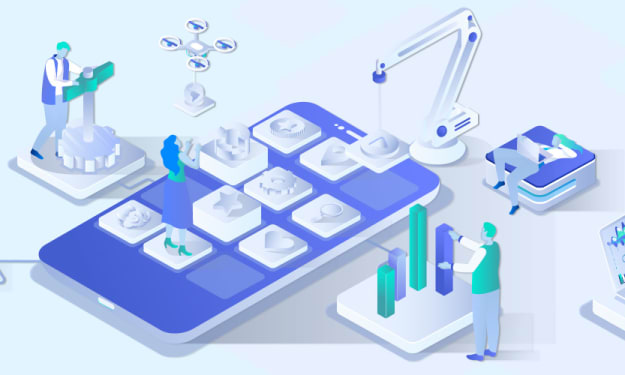10 Things a Java Programmer Should Learn in 2020
A Roadmap to 10 Things for a Java Programmer

“Programming is about managing complexity”. That’s how one of the well-known books on Java programming starts. Java continues to be one of the top 5 programming languages used by roughly 69% of developers globally, and it is important to keep up-to-date with abundant changes concerning frameworks and libraries releases, APIs enhancements, and Java version updates.
Here is a roadmap to 10 things every Java developer should know in 2020:
#1. JS Frameworks
The JavaScript universe is bursting with a bunch of frameworks, libraries, and tools. Angular, React and Vue.js are the three JavaScript frameworks that have altered the way Java web application development is done. Each of these frameworks is lightweight, flexible, rapid and suitable for modern app development. However, which one to choose depends entirely on the project’s needs and requirements.
#2. NoSQL
In 2020 every Java developer should learn the ropes of NoSQL. This database is popular for many reasons, including fast development, boosted scalability, big unstructured or unrelated data volumes storage, etc. With lots of NoSQL options available, MongoDB, Apache Cassandra, and Couchbase make the list of three most used ones.
NoSQL differs from SQL in the way that it doesn’t align with the Relational Databases principles such as normalization, fixed schemas, expressive queries support, etc.
#3. DevOps
According to the IDC study, the DevOps software tools market experienced strong growth in 2019 amounted to $8.5bn in total revenue. Global enterprises keep showing interest in DevOps via the gradual implementation of DevOps technologies.
However, some researchers forecast that the future of DevOps is a bit undermined due to the overall economic slowdown. Others don’t take DevOps as a trend but rather the standard tool that will soon become an integral part of software development process.
#4. Docker & Jenkins
Entering the DevOps world, great attention is taken to the tools like Docker, Jenkins, Kubernetes, Maven, etc. with Docker and Jenkins are getting game-changers now. There are a few reasons for that. Jenkins is open-source, easy to set up, and it entails an enormous amount of plugins. It’s used for the continuous software projects building and testing hence simplifying changes integration. Jenkins is used by Twitch, Lyft, Udemy, Netflix, etc.
Being a containerization platform, Docker ensures rapid software delivery also making it easier to incorporate new versions features into production as well as get back to the previous ones. It is also a nice tool while implementing blue/green deployment. Business Insider, Spotify, eBay, and others deploy Docker.
#5. Spring Boot
Spring Boot has been a widely used Java framework so far. The key upside of Spring Boot is the ease of use. Assuming the Spring community is providing support for many open-source tools and frameworks with Spring Cloud as an excellent example of it, you can come across easy and simple integrations with databases and messaging systems, and some other complex frameworks.
#6. Amazon AWS
Another thing every Java developer should be aware of are Cloud platforms. Using such Cloud platforms as Google Cloud Platform (GCP), Amazon Web Service (AWS), or Microsoft Azure deliver budget-consciousness, provide better scalability, ensure data security, mobility, and disaster recovery.
Amazon AWS is now holding the leading positions on the global market as the most popular, reliable, and mature cloud computing platform spanning over 245 countries and locations worldwide.
#7. RESTful Web Service
The representational State Transfer (REST) is used to build maintainable, lightweight, and scalable web services. The key notion of REST APIs is that they deliver great flexibility meaning data is not glued to methods or resources. The REST architectural style is developed to use a stateless communication protocol, usually HTTP.
#8. Microservices Architecture
Microservices are the extension of RESTful web services that, when used effectively, pay off in the era of cloud computing and containerization.
The key idea behind microservices is that apps, when broken down into fragments working seamlessly, are easier to build and maintain. Relying on microservices architecture, software functionality is divided into independent modules. Each of them is responsible for executing a standalone task.
#9. Search & Analytics Engines
If Elasticsearch, Cordova, Amazon CloudSearch, and Solr seem alien to you, it’s high time to get familiar with the search and analytics engine alternatives. The majority of these engines are open-source, user-friendly, and have active communities propelling the technologies forward.
Since the majority of search engines are wrapped around the library, different apps based on their requirements ask for different search engines.
#10. Java 15
In 2020 Java celebrates its 25th birthday. The latest version of Java (JDK 15), announced on September 15, 2020. JDK 15 comprises new functionality features such as Hidden Classes and Edwards-Curve Digital Signature Algorithm with pre-existing preview features such as ZGC and Text Blocks now finished up.
JDK 15 aims to modernize the existing code via simpler and up-to-date implementations and deprecate outdated ports and functionality. However, Java SE 8 and 11 have been the milestone versions and now remain the ones used most often.
Java Development Fundamentals
Inevitably, there are some mandatory skills for Java developers to know. Those include:
Git. Git is a VCS (version control system) to track changes in source code. Check the step-by-step guide to get started.
Web Protocols. The comprehension of such protocols as HTTP, HTTPS, SSH, etc. protocols are essential when it comes to web app development.
Data Structures & Algorithms. These two constitute the building blocks of programs so you have to know such basic notions as ‘linked list’, ‘array’, ‘binary tree’, ‘hash table’, ‘stack’, ‘queue’, etc. and those of advanced such as B-tree, AVL tree, etc.
Algorithms are static methods used to carry out different operations on collections. To find out more about algorithms in Java, proceed with the Java tutorials.
Linux. Being one of the most popular OS to run web apps and Java apps, it’s important that a developer has a handle on Linux (both OS and the command line).
SQL. SQL is used to query a database. Building a website showing data from a database, the RDBMS (MS Access, MySQL, SQL Server, etc.), SQL, a web scripting language (ASP or PHP), and others are needed.
Conclusion
Overall, a lot should be taken into account when starting developing an application with Java: frameworks and tools, databases and infrastructure management. There is a lot of information that can be found on forums and communities, expert advice and proven experience and knowledge sharing.
About the Creator
Victoria Puzhevich
Lead Business Development Specialist at SCAND Ltd., with over 16 years of experience in IT, keeping track of the current and future trends in the sphere, sharing expert advice and relevant industry experience. More info here.






Comments
There are no comments for this story
Be the first to respond and start the conversation.